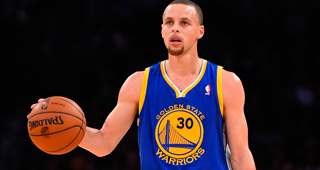Stephen Curry’s name came up for the first time in my writing almost exactly seven years ago in a draft preview for 2008, one year before he ended up declaring:

Beyond an absolutely horrendous attempt to create a nickname and some unnecessary contractions, quite a bit of that actually holds up. Curry’s game has grown so much over the years, but that “it” factor and his almost comical shooting range served as constant reminders that he could transcend being fun and become a true difference-maker on a great team.
It can feel like the distant past at points but Stephen Curry has run the gamut with a single franchise. After nearly getting traded to the Phoenix Suns, Curry joined a franchise just over two years past the “We Believe” team that felt entirely different. Baron Davis had moved on to the still-moribund Clippers and the 48-win team that had the best record of any team to miss the playoffs was supplanted by one that won 29 games. Adding Curry did not change Golden State’s fortunes in the short term, as the team actually finished three games worse at 26-56. Coincidentally, Curry’s first season at Oracle was my first covering the team. There are not many fun things to talk about in that kind of locker room but Curry stayed incredibly open about his frustration with losing. Towards the end of that season, he told me that during that season he had lost more games than in college and high school combined. While frustrating then, those hard times put recent success in greater perspective.
While shooting got him into the league and would have kept him there for a full NBA career, Curry made a concerted effort to grow his game into something much greater than that. Despite being one of the best spot-up shooters in the entire league early on, Curry saw himself as a point guard- the orchestrator of an offense rather than a cog in it. Excluding the lockout year where he only played 26 games, Curry’s Assist Percentage grew from 24.6% (right about where former teammate Monta Ellis ended up last year) to 39.9% and fifth place in the entire NBA. At the same time, Curry evolved into a new kind of point guard who combined the mentality of a primary ballhandler with the skill of an elite scorer. This season, Curry broke his own record for three pointers made, finished sixth in Assist Percentage and was the most efficient scorer among the top 75 in Points Per Game. The Baby-Faced Assassin has been an analytics darling for years but bolstered his MVP case by doing incredibly well in more traditional measures as he led the league’s #2 offense in Offensive Efficiency and #1 in terms of pure Points Per Game while finishing sixth in scoring. (Side note: Chris Paul, whose Clippers finished first in Offensive Efficiency, deserved much greater MVP consideration than he received from the voters.) Beyond all that, Curry played a role in the league’s best defense and continued to rebound well for a point guard, an underappreciated aspect of his game.
This season stood out because there were multiple worthy candidates that illustrated the challenge of giving a single top individual award, particularly with “most valuable” as the standard. James Harden, Chris Paul, Anthony Davis, LeBron James and Russell Westbrook all played pivotal roles in their team’s success. In fact, I had Harden as my MVP until about two weeks before the end of the regular season. It was that close.
It took years for Stephen Curry to become truly unguardable and that development made this honor possible. Improving his handle and passing ability meant teams could not play Curry as a jump shooter without facing severe consequences and Golden State’s front office assembled a team of talented players capable of hitting open shots and passing to create better looks, the perfect complement to Curry’s strengths. Changing coaches enabled the Warriors to become an offensive vanguard but Curry’s presence and skill made it possible.
One of my favorite statistics is that the last non-Pistons NBA champion without a player who had already won an MVP award came almost 35 years ago: the 1980-81 Celtics with Larry Bird, Kevin McHale, Robert Parish and Tiny Archibald. This shows the importance of individual dominance in this team sport and the balance that makes basketball so engaging. No one person can do it alone but very few teams can reach the mountaintop without a superstar. Stephen Curry has played his way into that elite company and absolutely could be the best player on a championship team. There may be larger team accomplishments over the next few months but we should take some time to appreciate the truly remarkable path of the NBA’s Most Valuable Player.



